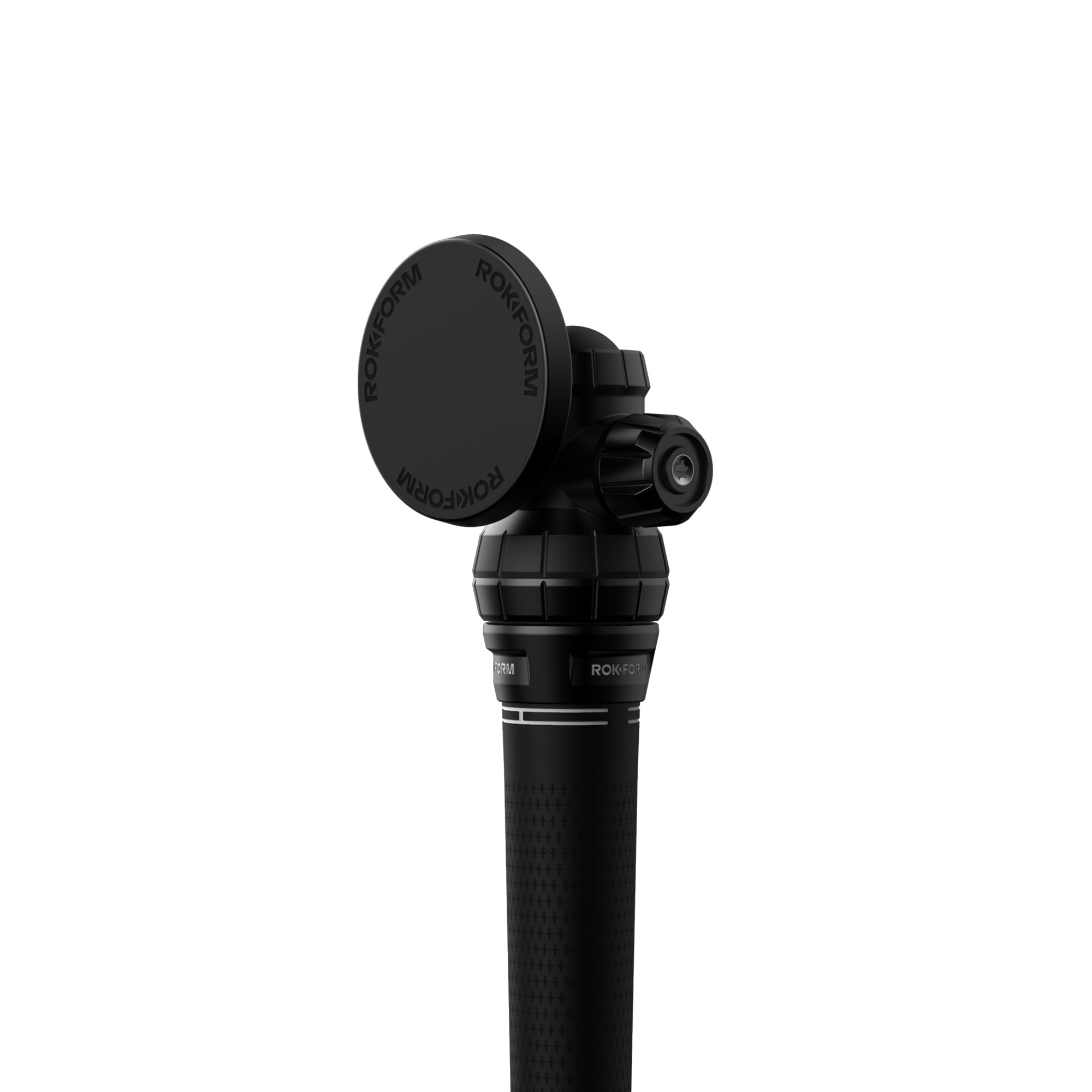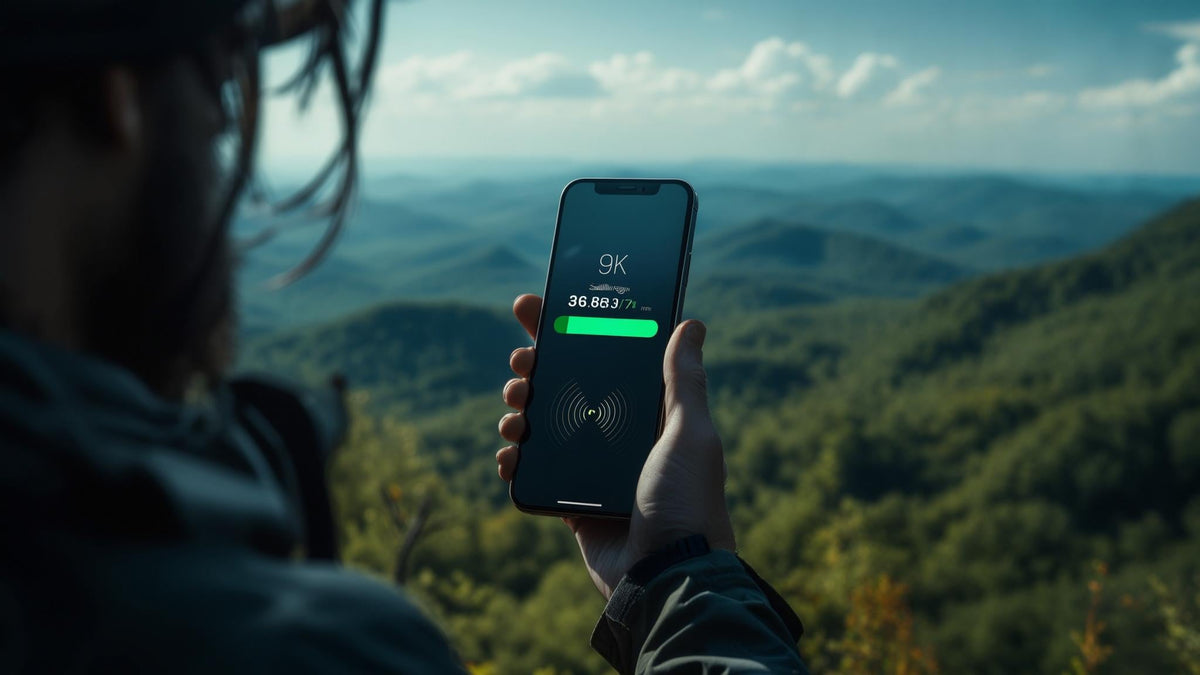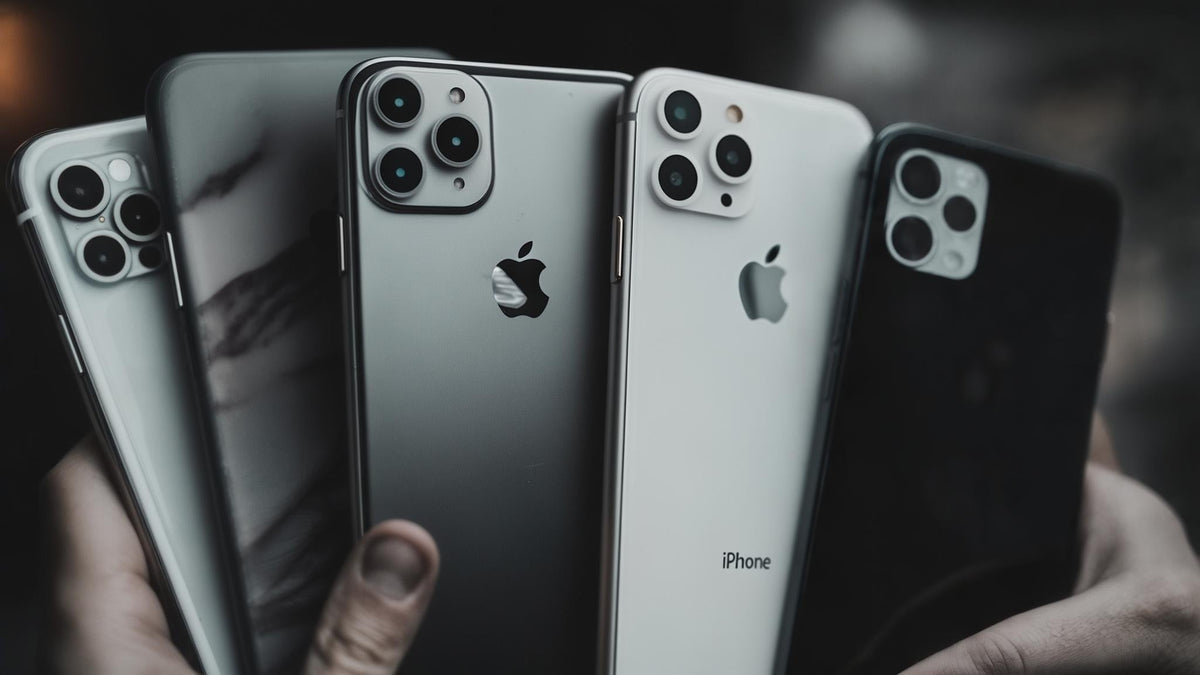Table of Contents
The Real Story Behind Apple's USB-C Switch
Which USB-C iPhone Should You Buy?
The Charging Revolution You'll Actually Notice
For Creative Pros: Why Transfer Speeds Matter
The Accessory Ecosystem: What Changes (And What Doesn't)
Built to Last: Why USB-C Is More Durable
How Rokform Enhances Your USB-C iPhone Experience
Making the Switch: Your Action Plan
TL;DR
Nine iPhone models currently feature USB-C connectivity: iPhone 15 series (4 models) and iPhone 16 series (5 models including the 16e)
Pro models offer USB 3.0 speeds up to 10 Gbps while base models use USB 2.0 at 480 Mbps
All USB-C iPhones support faster charging (20W+) compared to Lightning predecessors
Universal compatibility reduces cable clutter and improves accessory selection
Professional users benefit most from Pro model data transfer speeds for video and photography workflows
Transition costs for new accessories are offset by long-term universal compatibility benefits
USB-C ports offer improved durability and better retention compared to Lightning connectors
I remember the exact moment I realized how much cable chaos was ruling my life. Standing in my kitchen at 6 AM, frantically searching through three different charging cables scattered across the counter - Lightning for my iPhone, USB-C for my iPad, and another USB-C for my MacBook. I was already running late, my phone was dead, and I couldn't find the one specific cable I needed.
That frustrating morning became a thing of the past once I upgraded to a USB-C iPhone. According to MacRumors, USB-C iPhones, iPads, and Macs can be charged with the same cable and power adapter, preventing Apple users from needing to carry multiple types of cables.
But here's what I didn't expect: USB-C isn't just about convenience. It fundamentally changes how you interact with your phone, from lightning-fast file transfers to professional-grade connectivity options I never knew I needed. Whether you're a content creator moving massive video files or someone who just wants their phone to charge during a coffee break, understanding which iPhone USB-C model fits your life will save you time, money, and a lot of frustration.
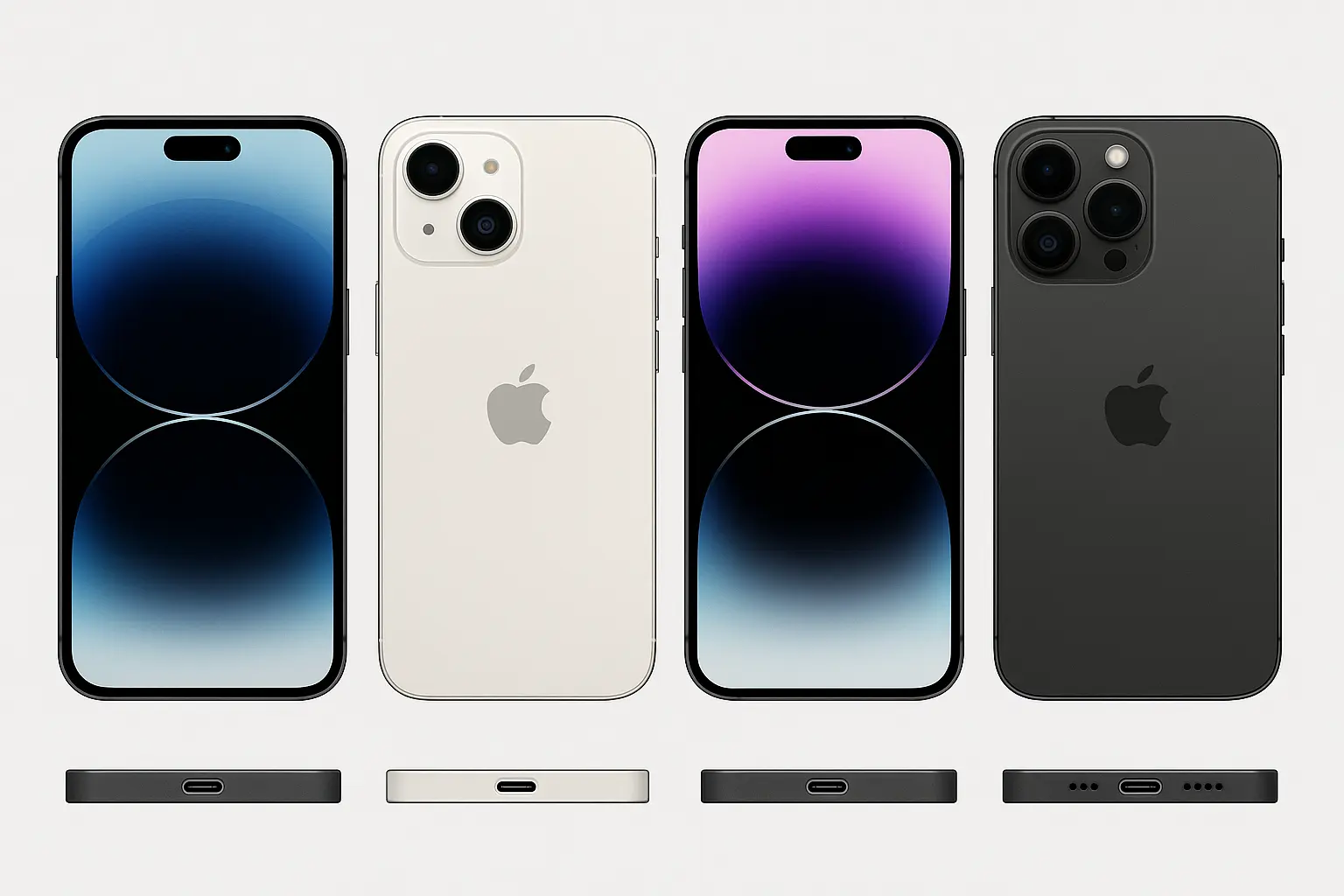
The Real Story Behind Apple's USB-C Switch
Apple didn't switch to USB-C just to make our lives easier (though that's a nice bonus). The European Union's mandate for universal charging ports forced their hand, but the result benefits everyone. USB-C represents a fundamental shift toward universal compatibility and enhanced performance that goes way beyond just charging your phone.
The shift affects everything from how fast your phone charges to what professional equipment you can connect. It's not just a port change - it's your gateway to a more connected, efficient mobile experience where one cable truly does rule them all.
Which USB-C iPhone Should You Buy?
Let's cut through the marketing speak and talk about what you actually need. Here's the breakdown of every iPhone USB-C model and who should buy what:
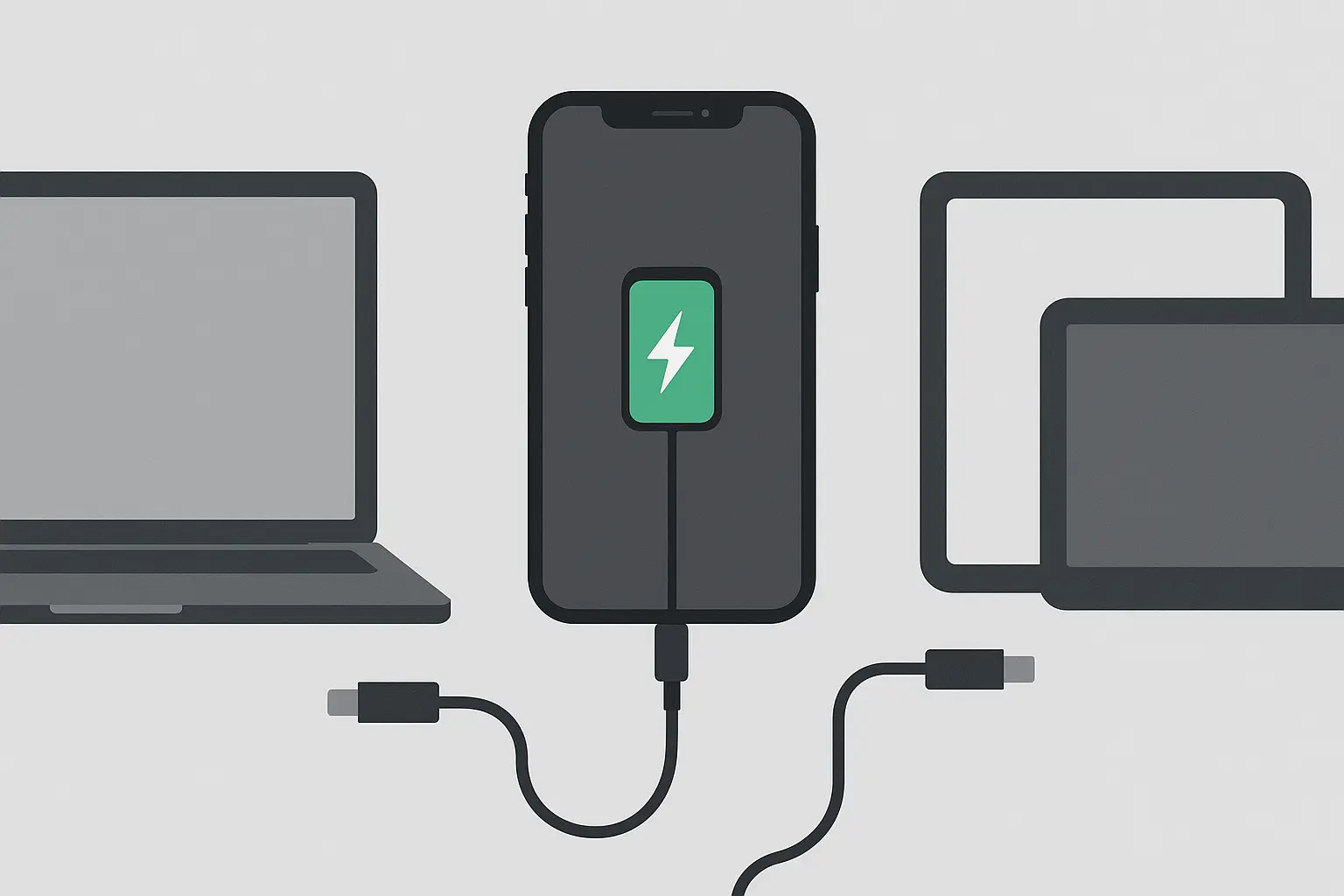
iPhone 15 - Your Gateway to USB-C Life
The iPhone 15 was Apple's "testing the waters" moment with USB-C. It's got everything most people need - faster charging and universal cables - without the premium price tag of the Pro models. You'll get USB 2.0 data transfer speeds (480 Mbps) and charging up to 20W.
Perfect for: People who primarily text, call, scroll social media, and take casual photos. If you're not regularly moving large files or editing videos on your phone, this is your sweet spot.
Real talk: The transfer speeds are the same as Lightning, but the charging speed improvement alone makes this worth it. Plus, you can finally use the same cable for your iPhone and iPad.
For daily protection during your transition to USB-C, consider exploring the iPhone 15 rugged case features that maintain full port accessibility.
iPhone 15 Plus - Same Great Features, Bigger Battery
Think of this as the iPhone 15's bigger sibling. Same USB-C implementation, same transfer speeds, but housed in a larger body with a battery that actually takes advantage of USB-C's faster charging capabilities.
Perfect for: Media consumption enthusiasts, people with larger hands, or anyone who wants longer battery life without paying Pro prices.
The advantage: That bigger battery means you'll spend less time tethered to chargers, and when you do need to charge, USB-C's speed gets you back to full power quickly.
iPhone 15 Pro - Where USB-C Gets Serious
Here's where things get interesting. The iPhone 15 Pro supports USB 3.0 with transfer speeds reaching 10 Gbps - that's roughly 20 times faster than the base model. If you've ever waited 30 minutes to transfer a video to your laptop, you'll understand why this matters.
Perfect for: Photographers, videographers, content creators, or anyone who regularly moves large files between devices.
Real-world example: A wedding photographer shooting in ProRAW format typically captures 200+ photos per event, with each file averaging 50MB. With the iPhone 15 Pro's USB 3.0, transferring these files to a MacBook for editing completes in 3-4 minutes instead of 45 minutes. That's the difference between starting your edit while the event is fresh versus waiting until the next day.
iPhone 15 Pro Max - The Ultimate USB-C Experience
Everything great about the iPhone 15 Pro, plus the largest battery and biggest screen Apple offers. This is for people who push their phones to the absolute limit and need every advantage they can get.
Perfect for: Power users, mobile professionals, content creators working with 8K video, or anyone who uses their phone as their primary computer.
Why it matters: The combination of USB 3.0 speeds and extended battery life means you can work longer between charges while maintaining professional-grade performance when transferring massive files.
iPhone 16 Series - The Next Evolution
The iPhone 16 lineup expands USB-C availability across five models, including the new iPhone 16e. While specific details are still emerging, expect refined charging protocols, potentially higher wattage support, and even better integration with professional equipment.
What we know: Each model maintains USB-C while potentially offering improvements in charging speed, data transfer protocols, and accessory compatibility. There's finally a USB-C iPhone for every budget and use case.
Learn more about the latest iPhone 16 protection options designed specifically for USB-C port accessibility.
iPhone Model |
USB-C Version |
Data Transfer Speed |
Best For |
Key Advantage |
|---|---|---|---|---|
iPhone 15 |
USB 2.0 |
480 Mbps |
Everyday users |
Universal charging convenience |
iPhone 15 Plus |
USB 2.0 |
480 Mbps |
Media consumers |
Longer battery + USB-C benefits |
iPhone 15 Pro |
USB 3.0 |
10 Gbps |
Content creators |
Professional transfer speeds |
iPhone 15 Pro Max |
USB 3.0 |
10 Gbps |
Power users |
Maximum performance + battery |
iPhone 16 Series |
Varies |
Enhanced protocols |
All segments |
Latest refinements |
The Charging Revolution You'll Actually Notice
Forget the technical specs for a moment. Here's what USB-C charging actually feels like in daily life: your phone goes from dead to usable during a coffee break, not during an entire lunch break.
Speed That Actually Matters
USB-C transforms iPhone charging from a slow, overnight process to something you can accomplish between meetings. Most USB-C iPhones support 20W+ charging, with Pro models handling even higher wattages when paired with appropriate adapters.
The difference hits you immediately. A 15-minute charge now provides hours of usage instead of barely keeping up with basic functions. You're no longer planning your day around charging schedules.
Charging Scenario |
Lightning iPhone |
USB-C iPhone |
Your Time Savings |
|---|---|---|---|
0-50% Battery |
45-60 minutes |
25-30 minutes |
~50% faster |
Coffee Break (15 min) |
15-20% charge |
35-40% charge |
Actually useful power |
Emergency Top-up (5 min) |
5-8% charge |
12-15% charge |
Enough for important calls |
Full Charge |
2.5-3 hours |
1.5-2 hours |
1+ hour of your life back |
Universal Power Solutions
The power bank market opens up completely with USB-C iPhones. You're no longer limited to Lightning-specific portable chargers that cost more and do less. High-capacity power banks designed for laptops work perfectly with your iPhone, often providing faster charging than Lightning alternatives ever could.
Traveling with friends becomes less complicated too. Everyone can share the same portable charger regardless of their device brand. No more hunting for that one person who remembered to bring a Lightning cable.
Car and Travel Charging Made Simple
Modern vehicles increasingly feature USB-C ports built right into dashboards. Your USB-C iPhone connects directly without adapters or hunting through a collection of car-specific cables. Road trips become less about cable management and more about actually enjoying the journey.
For optimal in-vehicle charging setup, explore the best car phone mounts that work seamlessly with USB-C charging cables.
International travel gets dramatically easier too. USB-C is the global standard, so finding replacement cables or chargers in Tokyo, London, or São Paulo becomes as simple as stopping at any convenience store. Try doing that with a Lightning cable.
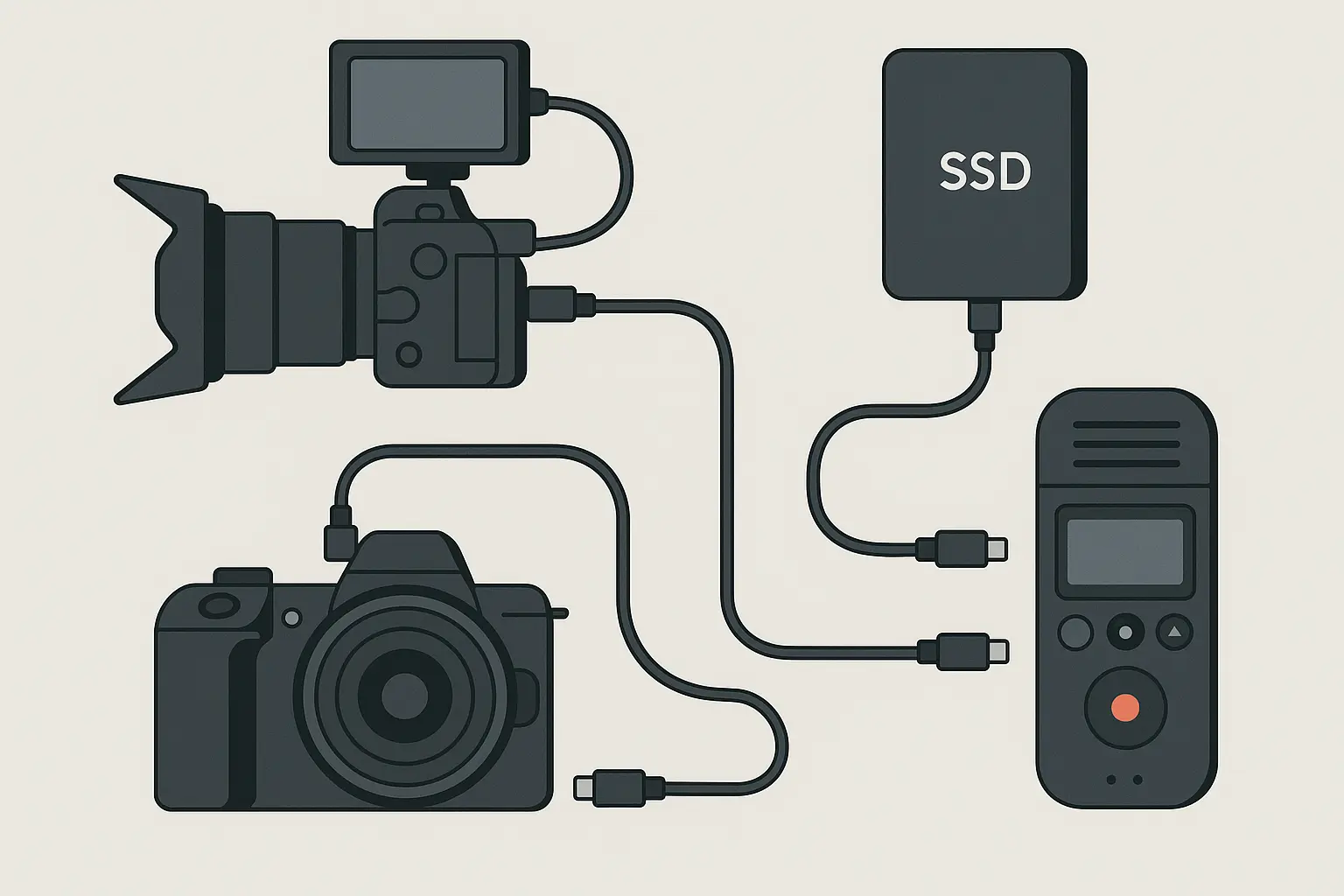
For Creative Pros: Why Transfer Speeds Matter
If you only use your phone for social media and texting, feel free to skip this section. But if you create content, edit photos, or move large files regularly, this is where USB-C iPhone models truly shine.
Video Content Creation That Actually Works
Video creators working with 4K footage will immediately notice what USB 3.0 means on Pro models. That 10GB video file that previously took 30+ minutes to transfer now completes in under 5 minutes. This isn't just about saving time - it transforms your entire mobile video workflow from a frustrating bottleneck into an efficient process.
The real game-changer? Direct connection to professional video equipment. External recorders, professional monitors, and storage systems that use USB-C can interface directly with your iPhone. Suddenly, your phone becomes the center of a sophisticated mobile production setup.
Photography Workflows That Keep Up
RAW photo files from modern iPhones are substantial, especially ProRAW format shots that can hit 75MB each. USB-C's faster transfer speeds mean backing up a day's worth of photography happens in minutes, not hours. Professional photographers can maintain their shooting rhythm without lengthy transfer delays killing their momentum.
Real-world scenario: A real estate photographer captures 150 ProRAW images during a property shoot. With Lightning, transferring these files to external storage would require 2+ hours. Using a USB-C iPhone 15 Pro connected directly to a USB-C SSD, the entire transfer completes in 8 minutes. That's the difference between immediately starting your next shoot versus losing half your day to file management.
External Storage and Professional Audio
External SSD drives connect directly to USB-C iPhones, providing terabytes of additional storage space. Content creators who need to store large video projects locally or professionals requiring extensive document libraries can work without the limitations of internal iPhone storage.
Professional audio interfaces designed for USB-C work directly with iPhones too. Podcasters, musicians, and content creators can connect professional microphones, mixing boards, and audio processors without adapters. Your iPhone becomes a legitimate mobile recording studio.
Multi-Device Professional Setups
USB-C hubs transform your iPhone into a productivity powerhouse. Connect external monitors, keyboards, storage devices, and audio equipment simultaneously. Mobile professionals who need desktop-like functionality while traveling finally have a solution that actually works.
Conference room presentations become simpler when you can connect to projectors, audio systems, and external storage through a single hub. Your iPhone serves as the central command center for complex professional workflows.
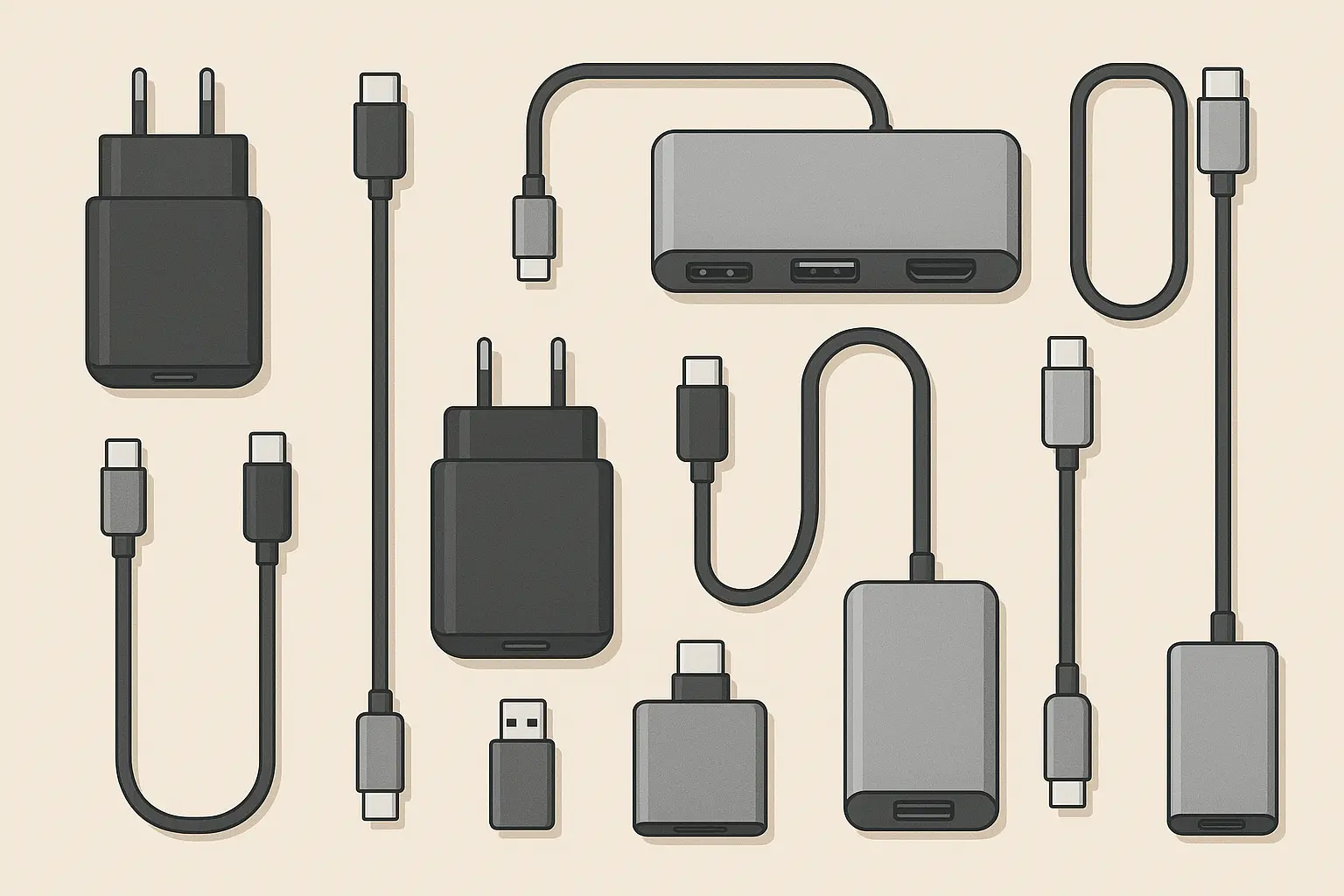
The Accessory Ecosystem: What Changes (And What Doesn't)
Let's be honest about the transition: you'll need to buy some new stuff. But here's the thing - it's actually worth it, and it's not as expensive or complicated as you might think.
Your Desk Setup Gets Instantly Cleaner
Instead of separate Lightning, USB-C, and micro-USB cables scattered everywhere, you need just USB-C cables. This simplification goes beyond aesthetics - you'll spend less time hunting for the right cable and more time actually using your devices.
Cable management systems work better when everything uses the same connector. Desk organizers, cable trays, and charging stations become more effective when they're not accommodating multiple cable types with different sizes and shapes.
The Accessory Market Opens Up
Here's where things get interesting: the accessory market explodes with options once you switch to USB-C. Competition drives innovation and keeps prices reasonable. You'll find everything from budget cables that work perfectly to premium accessories with advanced features - all without paying the "Lightning tax" that limited your options before.
Need a right-angle cable for tight spaces? A retractable cable for travel? A braided cable for durability? The USB-C ecosystem provides countless options from manufacturers worldwide, not just Apple-certified Lightning accessories.
Smart Transition Strategy
Not every Lightning accessory needs immediate replacement. Here's your priority list:
Replace immediately: Daily charging cables (home, office, car). These are your most-used accessories, and USB-C's speed advantage makes the biggest difference here.
Replace within 3 months: Car chargers and travel accessories. The universal compatibility benefits become obvious quickly when you're on the road.
Replace when convenient: Specialty accessories like camera adapters or audio interfaces. Quality adapters can bridge the gap while you find better USB-C alternatives.
Keep as backup: Emergency cables and rarely-used accessories. No rush here - replace them as better deals become available.
Accessory Category |
Immediate Priority |
Transition Strategy |
Why It Matters |
|---|---|---|---|
Daily Chargers |
High |
Replace immediately |
Daily speed benefits |
Car Chargers |
High |
Replace within 3 months |
Travel convenience |
Audio Equipment |
Medium |
Quality adapters work |
Professional needs vary |
Specialty Tools |
Low |
Gradual replacement |
Cost-effective approach |
Universal Mounting Solutions
Mounting systems become brand-agnostic with USB-C. Whether you need a car mount, motorcycle mount, or desktop stand, you're not limited to iPhone-specific solutions. Universal mounts often cost less and offer more features since they serve a broader market.
For professional mounting solutions, consider the best motorcycle phone mounts that accommodate USB-C charging while maintaining secure device protection.
International Travel Gets Easier
Finding replacement cables or chargers while traveling internationally becomes much simpler. USB-C is the global standard for modern electronics, so you'll find compatible accessories in electronics stores worldwide. Lightning cables? Good luck finding those outside of Apple stores or premium retailers.
Real example: A consultant traveling through multiple countries discovers their charging cable damaged at the first destination. With a Lightning iPhone, they'd spend hours searching Apple stores, finally paying premium prices. With a USB-C iPhone, the same cable is available at any convenience store, electronics shop, or airport kiosk for a fraction of the cost.
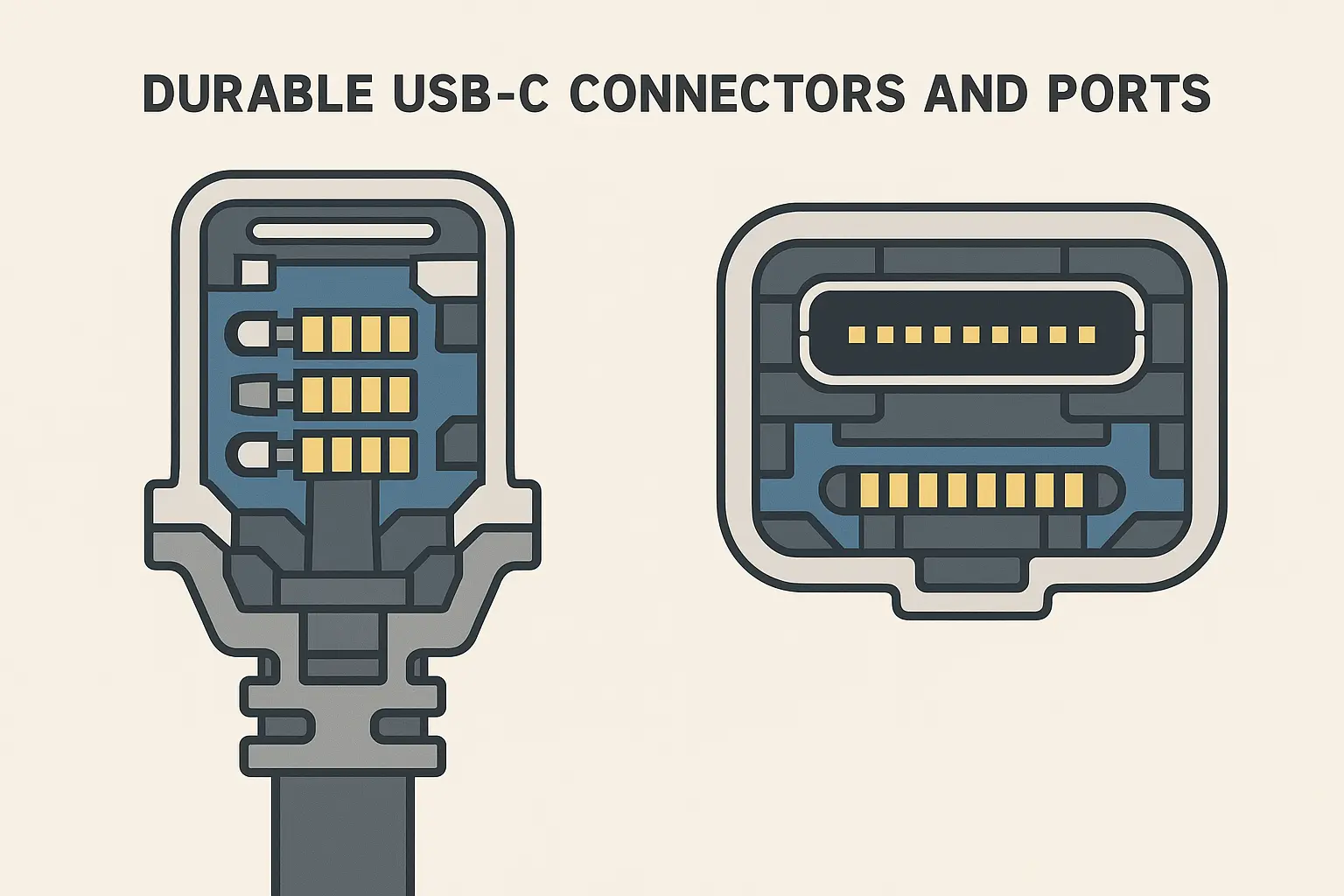
Built to Last: Why USB-C Is More Durable
Beyond speed and compatibility, USB-C simply holds up better to daily abuse. If you're hard on your devices or charge multiple times daily, these durability improvements matter more than you might expect.
Connectors That Handle Real Life
USB-C connectors handle daily wear better than Lightning ports. The symmetrical design means you can't insert cables incorrectly, eliminating the stress on internal components that comes from forcing connectors the wrong way. The connector itself uses more robust materials and construction that resist damage from frequent use.
Heavy Heavy users who charge multiple times daily will appreciate this durability improvement. The port maintains a secure connection even after thousands of insertion cycles, something that becomes critical if you rely on your phone for professional work or extended daily use.
Water Resistance Without Compromise
Apple maintained full IP68 water resistance when transitioning to USB-C. Your phone handles rain, splashes, and accidental submersion just as well as Lightning models. The port design includes proper sealing that doesn't compromise when you plug and unplug cables regularly.
Outdoor enthusiasts can rely on the same level of protection they're accustomed to. Whether you're hiking in wet conditions, working around water, or just dealing with everyday spills, the USB-C port won't become a vulnerability in your phone's defense against moisture.
Cables That Actually Last
USB-C cables last longer than Lightning cables in most real-world scenarios. The connector design distributes stress more evenly, and the broader manufacturing base means more companies are investing in quality improvements. You'll replace cables less frequently, saving money over time.
The reversible design eliminates the wear that comes from forcing connectors the wrong way. Lightning cables often fail at the connector due to repeated stress from incorrect insertion attempts. USB-C's symmetrical design prevents this type of damage entirely.
Connections That Stay Put
USB-C connections stay secure better than Lightning connectors. The retention mechanism provides more reliable connections that resist accidental disconnection when you move your phone or when cables get tugged. This reliability becomes crucial during data transfers or when using your phone while charging.
Professional users particularly benefit from this improved connection security. Video transfers, audio recording, and other professional applications require stable connections. USB-C's superior retention force means fewer interrupted transfers and more reliable professional workflows.
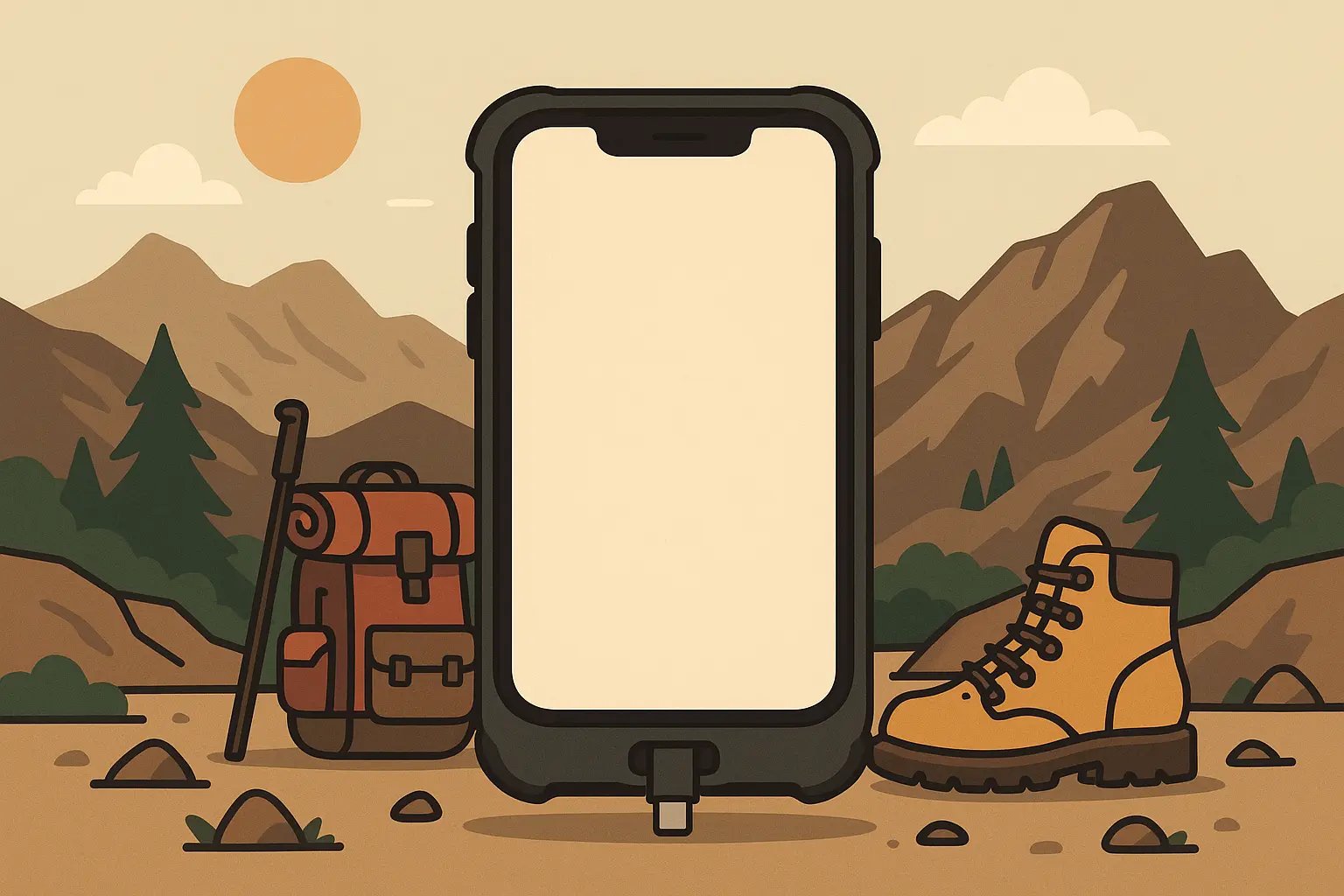
How Rokform Enhances Your USB-C iPhone Experience
Speaking of protection during your USB-C transition - if you're someone who's hard on their phone (think construction sites, mountain biking, or just general clumsiness), make sure your case doesn't block that new USB-C port. The last thing you want is to finally get universal charging, then realize your case makes it impossible to plug anything in.
Rokform's cases work flawlessly with all USB-C iPhone models, providing military-grade protection while maintaining full port accessibility. The same RokLock™ mounting system that's trusted by professionals worldwide adapts seamlessly to your new USB-C iPhone, whether you're mounting it on a motorcycle, securing it during outdoor adventures, or protecting it in demanding work environments.
For professionals leveraging USB-C's enhanced data transfer speeds, this protection becomes even more critical. When your iPhone serves as a crucial tool for transferring large video files or connecting professional equipment, you need protection that won't fail when it matters most.
The combination of USB-C's universal charging capabilities and Rokform's rugged protection creates an ideal setup for active lifestyles. You get the convenience of universal charging without sacrificing the durability needed for real-world adventures.
Discover how professional mounting solutions integrate seamlessly with USB-C charging requirements for work vehicles and equipment.
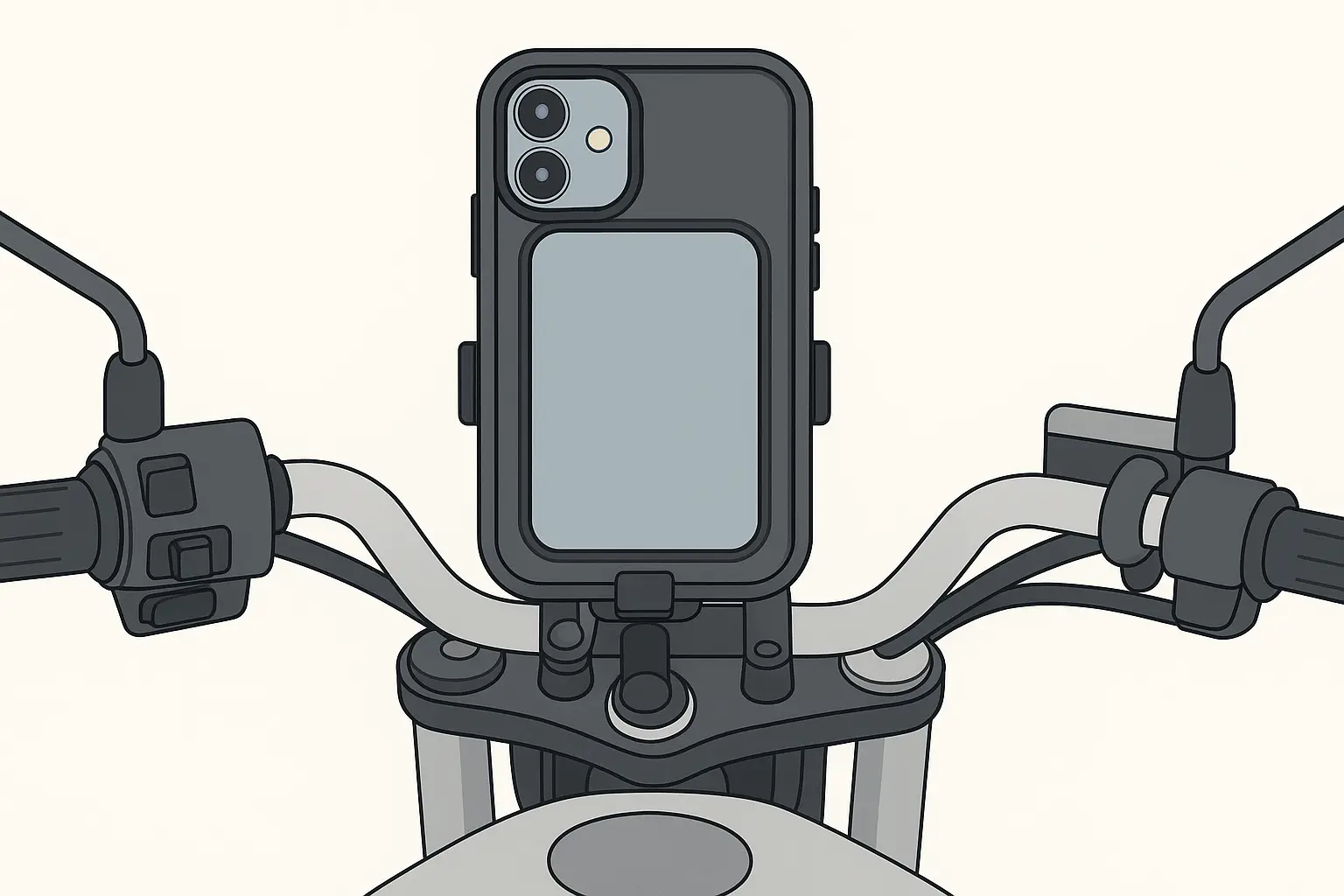
Ready to protect your USB-C iPhone investment? Explore Rokform's complete lineup of cases and mounting solutions designed to work seamlessly with your new device while providing the durability and security you need for any adventure.
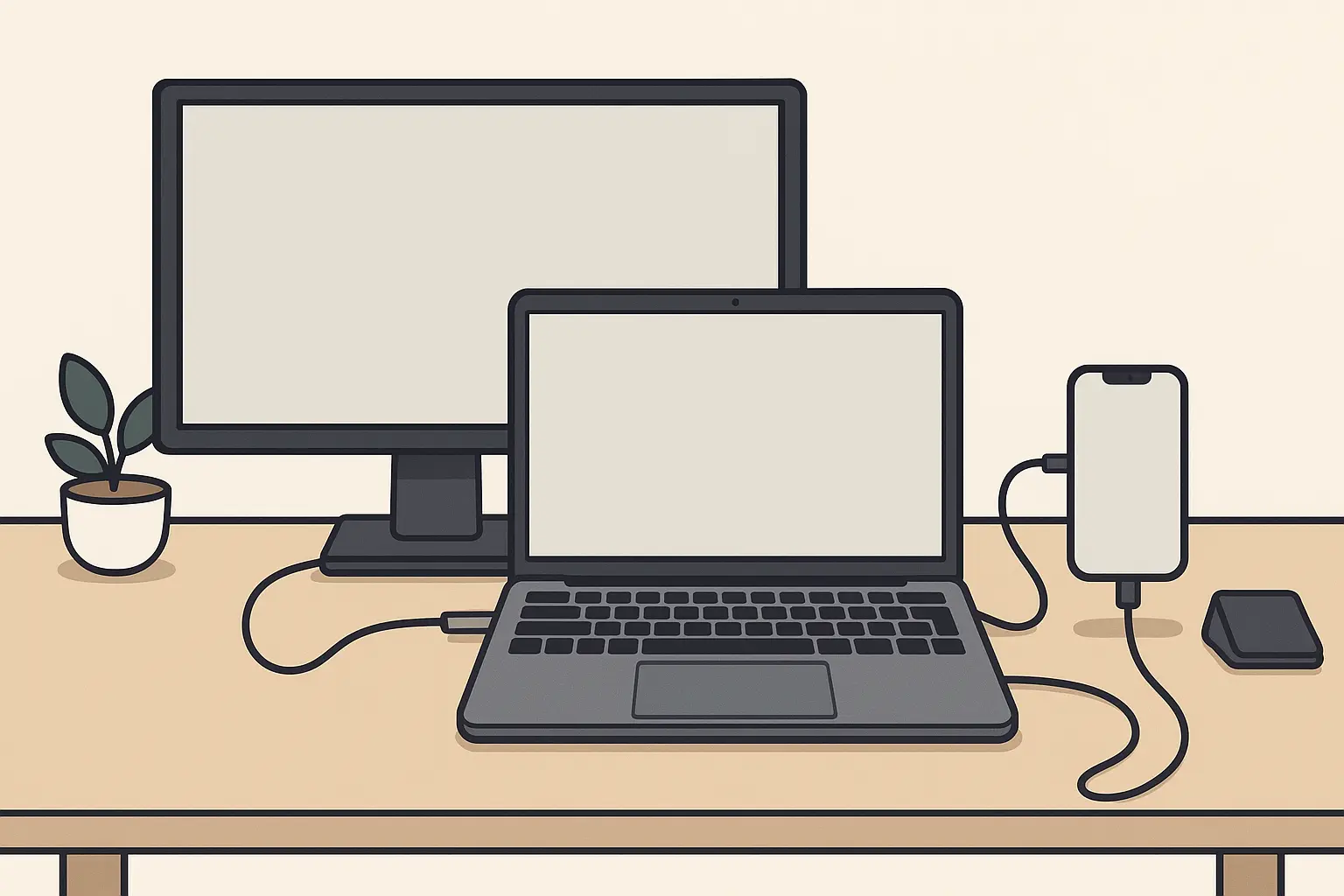
Making the Switch: Your Action Plan
Look, switching to USB-C isn't just about having the latest tech - it's about simplifying your life. Sure, you'll need to buy some new cables, but imagine never again digging through a drawer full of random cables looking for that one Lightning cord. Your future self will thank you.
Step 1: Choose Your iPhone USB-C Model
iPhone 15/15 Plus: Perfect if you want USB-C benefits without paying Pro prices
iPhone 15 Pro/Pro Max: Essential if you regularly transfer large files or need professional connectivity
iPhone 16 Series: Latest refinements and potentially enhanced charging protocols
Step 2: Plan Your Accessory Transition
Start with what you use daily - home charger, car charger, work desk cable. These give you the biggest immediate benefit from USB-C's faster charging speeds. Everything else can wait for good deals or natural replacement cycles.
Step 3: Consider Total Cost of Ownership
Yes, you'll spend $50-100 replacing your Lightning accessories initially. But USB-C accessories are cheaper long-term because there's actual competition. Plus, you'll buy fewer cables overall since everything uses the same connector.
The charging speed improvement alone saves time daily, and if you're a creative professional, the transfer speed benefits pay for themselves quickly through improved workflow efficiency.
Your USB-C iPhone Journey Starts Now
The transition to USB-C represents more than just a port change - it's a fundamental shift toward universal compatibility and enhanced performance. Whether you choose the base iPhone 15 for everyday USB-C benefits or the Pro Max for maximum professional capabilities, you're investing in a more connected, efficient mobile experience.
Understanding these considerations helps you make an informed decision that aligns with your specific needs and usage patterns. The initial investment in new accessories and the learning curve of transitioning from Lightning will quickly pay dividends through improved charging speeds, universal compatibility, and access to a broader ecosystem of accessories and professional tools.
For comprehensive protection during your USB-C transition, explore the most protective phone cases that maintain full port accessibility while providing maximum device security.
Your USB-C iPhone journey starts with choosing the right model for your needs, but it extends far beyond that initial purchase. From professional workflows to outdoor adventures, from international travel to daily convenience, USB-C connectivity transforms how you interact with your device and the world around it.





